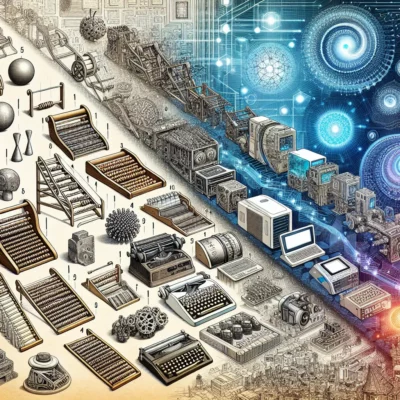Introduction to AI’s Evolution
Artificial Intelligence (AI) has come a long way since its inception. From the early days of Alan Turing’s theoretical work to the development of neural networks and deep learning, AI has rapidly evolved, becoming a cornerstone of modern innovation. In recent years, AI has permeated various industries, revolutionizing how businesses operate and interact with consumers. This transformative power is setting the stage for future possibilities, where AI could redefine industries and create new paradigms of efficiency and creativity.
AI in Healthcare: Revolutionizing Patient Care
The healthcare industry is undergoing a significant transformation thanks to AI. By enhancing diagnostics and personalized medicine, AI tools can analyze vast amounts of medical data to identify patterns and predict patient outcomes with unprecedented accuracy. This capability allows for more precise treatment plans and early detection of diseases.
AI also plays a crucial role in streamlining hospital operations and patient management. From automating routine tasks to optimizing schedules and resource allocation, AI helps healthcare providers deliver better care while reducing costs. Looking ahead, AI-driven drug discovery and telemedicine advancements promise to further revolutionize patient care, making healthcare more accessible and efficient.
Manufacturing and Automation: The New Industrial Revolution
In the manufacturing sector, AI is spearheading a new industrial revolution. By enhancing production efficiency and quality control, AI systems can monitor and analyze production processes in real-time, identifying defects and optimizing workflows. This leads to higher quality products and reduced waste.
AI’s impact on workforce dynamics is also noteworthy. While automation may replace some manual jobs, it also creates new opportunities for skilled workers in AI development and maintenance. The future of manufacturing looks promising with smart factories and AI-driven supply chains that adapt to changing demands and streamline operations.
Financial Services: From Banking to Blockchain
The financial services industry is leveraging AI to enhance risk assessment, fraud detection, and customer service. AI algorithms can analyze transaction data to identify suspicious activities, ensuring secure and efficient operations. Additionally, AI-powered chatbots and virtual assistants improve customer interactions by providing personalized support around the clock.
The integration of AI with blockchain technology is another exciting development. This combination offers secure, transparent transactions and has the potential to revolutionize financial systems. Predictive analytics and AI-driven investment strategies are also on the rise, providing investors with insights to make informed decisions in a volatile market.
Retail and E-commerce: Personalized Shopping Experiences
AI is transforming the retail and e-commerce landscape by offering personalized shopping experiences. Through data analysis, AI can predict consumer preferences and tailor recommendations, enhancing customer satisfaction and loyalty. This personalization extends to inventory management and logistics optimization, where AI helps retailers maintain optimal stock levels and streamline delivery processes.
Future possibilities in retail include virtual shopping assistants and AI-enhanced augmented reality (AR) experiences, allowing consumers to visualize products in their homes before making a purchase. These innovations promise to redefine the shopping experience, making it more interactive and engaging.
AI in Transportation: Towards Autonomous Mobility
The transportation industry is on the brink of a revolution with advancements in self-driving technology and smart traffic systems. AI algorithms enable vehicles to navigate complex environments, reducing accidents and improving traffic flow. These technologies are not only enhancing safety but also transforming logistics and delivery services by optimizing routes and reducing delivery times.
Looking ahead, AI-powered urban planning and sustainable transport solutions could reshape cities, making them more efficient and environmentally friendly. Autonomous mobility promises to reduce congestion and pollution, creating a more sustainable future.
Education and AI: Personalized Learning Journeys
AI is reshaping education by enabling personalized learning journeys. Through adaptive learning environments, AI can tailor educational content to individual student needs, ensuring that each learner progresses at their own pace. This approach enhances student engagement and improves learning outcomes.
AI also plays a role in curriculum development and student assessment, providing educators with insights to refine teaching methods and identify areas for improvement. The future of education could see AI tutors offering personalized support and global access to quality education, breaking down barriers to learning.
Ethical Considerations and Challenges
As AI continues to evolve, ethical considerations and challenges must be addressed. Privacy concerns and data security are paramount, as AI applications often require access to sensitive information. Ensuring ethical AI development and usage is crucial to maintaining public trust and avoiding unintended consequences.
Balancing innovation with societal impact and regulatory measures is essential. Policymakers and industry leaders must work together to create frameworks that encourage responsible AI development while fostering innovation.
Envisioning the Future: AI’s Role in Emerging Industries
The potential for AI in unexplored sectors is vast. From agriculture to entertainment, AI could drive innovation and efficiency in ways we have yet to imagine. Interdisciplinary collaboration will be key to unlocking these possibilities, as experts from different fields come together to develop AI solutions that address complex challenges.
Encouraging a forward-thinking mindset among businesses and entrepreneurs will be crucial in harnessing AI’s full potential. By embracing AI and its transformative power, industries can pave the way for a future where technology and human ingenuity work hand in hand to create a better world.
